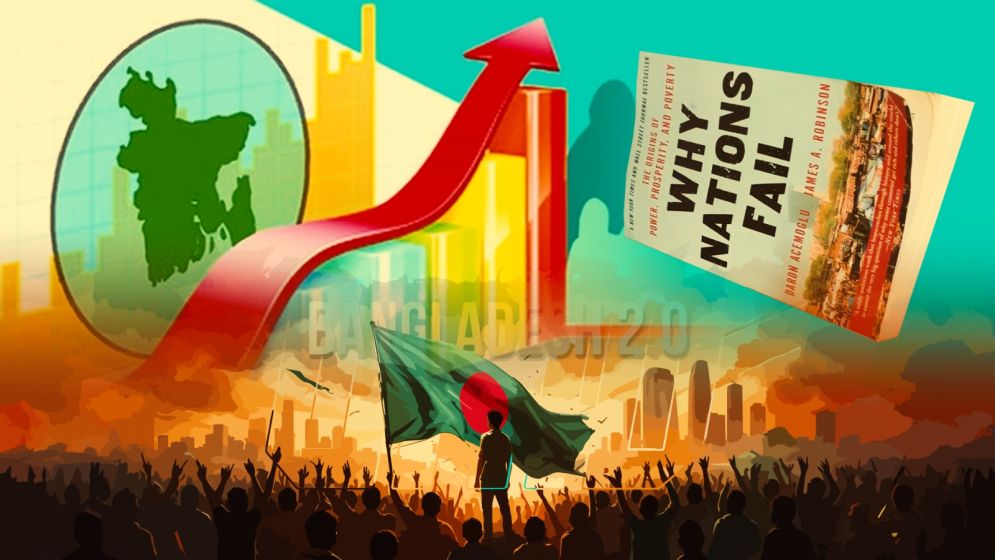Lessons from 'Why Nations Fail': Shaping Bangladesh 2.0 for a stronger future

Why Nations Fail, the captivating work by Daron Acemoglu and James A. Robinson resonated with me even more deeply after their well-deserved Nobel Prize win in Economics in 2024.
This insightful book delves into the critical question of why some nations develop strong, prosperous states while others falter.
Through a comparative lens, it examines the divergent paths taken by European and Western nations, which established robust state institutions, and the persistent struggles faced by many countries in Africa and Asia.
Acemoglu and Robinson masterfully explore the complex interplay of factors that influence a nation's trajectory. They analyze how geography, climate, culture, and even societal knowledge gaps contribute to the success or failure of states.
For example, they argue that nations with tropical climates may face agricultural challenges and a lack of intellectual curiosity, potentially leading to oppressive rule and corruption.
Furthermore, they suggest that cultural traditions in some sub-Saharan African nations might hinder the adoption of technological advancements. The authors also introduce the "ignorance hypothesis," which posits that market failures play a significant role in perpetuating poverty.
However, Why Nations Fail goes beyond simply diagnosing the problems. It offers a compelling path forward for struggling nations, emphasizing the need for profound political transformation.
This transformation must prioritize inclusive economic institutions that empower a broad spectrum of society and distribute political power widely instead of merely shifting it among elites.

Drawing inspiration from historical
events
The authors of "Why Nations Fail" draw powerful inspiration from two pivotal historical events: England's Glorious Revolution of 1688 and the French Revolution of 1789.
These revolutions, though distinct in their nature and consequences, offer crucial insights into how statehood and economic development are intricately intertwined.
England's trajectory in the 17th century stands out. Amidst a period of sustained economic growth, the country underwent a series of institutional changes that were remarkably inclusive for the time.
This culminated in the Glorious Revolution, a political upheaval born not from consensus, but from intense conflict between competing groups vying for power and influence.
The Glorious Revolution fundamentally reshaped the English state. It curtailed the power of the monarchy and the executive branch, transferring significant authority to Parliament, particularly over economic institutions.
This shift opened the political system to a broader segment of society, allowing them to influence state functions and laying the foundation for a pluralistic system.
Critically, this revolution spurred political centralization and the creation of what the authors argue were the world's first truly inclusive political institutions.
These institutions strengthened and clarified property rights, fostered the development of robust financial markets, and removed obstacles to industrial expansion.
The English state actively promoted mercantile activities, dismantling the old feudal economic order and encouraging innovation in trade and investment.
This combination of factors – infrastructure development, technological progress, a burgeoning entrepreneurial spirit, and the effective utilization of skills and talent within inclusive institutions – fueled England's industrial growth and propelled it to become a dominant global power for the next two centuries.
The Glorious Revolution in England obviously marked a decisive turning point. It shattered the grip of absolutism, empowered a broader segment of society, and fostered a nascent pluralism.
This newfound inclusivity, both political and economic, created fertile ground for innovation and progress, allowing talented individuals to flourish and contribute to England's rise as a strong state.
Similarly, the French Revolution, though far more tumultuous, dismantled absolutism, abolished feudal structures, and established the crucial principle of equality before the law – essential steps in France's journey toward becoming a major European power.

The nation failing arguments and
Bangladesh..
"Why Nations Fail" argues that nations falter when they fail to create inclusive institutions. Corruption, oppression, and inadequate education become entrenched, perpetuating poverty and hindering progress.
The book's 2024 Nobel Prize win is particularly resonant given the recent Monsoon Revolution in Bangladesh, a potential harbinger of transformative change. This revolution presents a crucial opportunity to reflect on the lessons of history and chart a new course for the nation.
Bangladesh emerged from the passionate struggle for independence in 1971, but its journey toward establishing a stable and prosperous state has been fraught with challenges. The lack of sustained political will to build truly inclusive institutions created the conditions for the 2024 uprising, a rekindling of the spirit of '71. Now, Bangladesh has a chance to build on this momentum and realize its full potential.
To do so, the nation must move beyond any form of extreme nationalism that hinders progress. This doesn't mean erasing history, but rather embracing the deeper philosophical ideals that underpinned the struggle for independence – ideals of justice, equality, and opportunity for all.
By learning from the successes and failures of other nations, as illuminated in "Why Nations Fail," Bangladesh can forge a path towards a more inclusive and prosperous future, honoring the sacrifices made during the 2024 revolution and fulfilling the promise of its birth.
Bangladesh has endured a period where virtue and wise governance were overshadowed by vice and deceit. Talent was sidelined, allowing incompetence to flourish in leadership positions, and voices of dissent were often suppressed.
To thrive in the interconnected world of today, Bangladesh must embrace inclusive politics that prioritize the needs of its citizens and reject artificial divisions based on social, cultural, religious, or political differences.
Effective governance demands a steadfast commitment to the rule of law, accountability, and the mobilization of all segments of society to drive genuine economic growth.
Bangladesh must adopt a geopolitical strategy that positions it as a strong and independent nation, refusing to be a pawn in the geopolitical games of larger powers.
This is a unique opportunity to forge mutually beneficial relationships with countries near and far, based on cooperation and respect, not exploitation.
A renewed sense of nationhood should be founded on the spirit of cooperation, echoing the universal truth found in all religions: that serving those in need is a form of worship.
Accelerating the state-building process requires a collaborative effort, bringing together professionals from all communities to combine their skills, knowledge, and experience. This collective effort must strive to create a corruption-free society where oppression has no place.
Finally, education must be reimagined to align with the aspirations of the young generation who courageously ushered in the "Glorious Revolution of 2024."
By nurturing critical thinking, fostering creativity, and promoting a sense of civic responsibility, education can empower future generations to build a truly just and prosperous Bangladesh.
—-
Brigadier General (Retd) AF Jaglul Ahmed, NDC, PSC, PhD is a regular contributor in national daily’s

